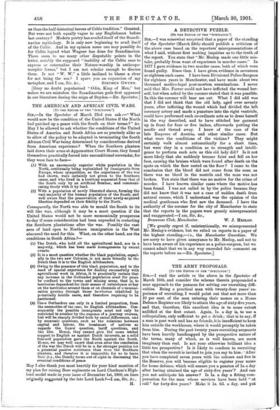THE AMERICAN AND AFRICAN CIVIL WARS.
[TO THE EDITOR OF' THE "SPECTATOR.']
SIR,—In the Spectator of March 23rd you ask :—" What would now be the condition of the United States if the North had patched up a peace with the South on their terms ?" &c. May I be allowed to ask whether the conditions of the -United States of America and South Africa are so precisely alike as to allow of the policy to be adopted in terminating the South African Civil War being determined by considerations derived from American experience ? When the Southern planters laid down their arms at Appomattox Court House, they found themselves practically forced into unconditional surrender, for they were face to face— (1) With an enormously superior white population in the North, continually being replenished by immigrants from Europe, whose sympathies, as the experience of the war had shown, were certainly not given to the Southern cause, and who lived in a territory separated from that of the South only by an artificial frontier, and communi- cating freely with it by land.
(2) With a population of newly liberated slaves, forming the vast majority of the human population of the South, and well aware that the preservation of their newly-a,cquired liberties depended on their fidelity to the North.
Consequently, the North was able to mould the South to its will like wax, although it may be a moot question if the United States would not be more economically prosperous to-day if some consideration had been expended in restarting the Southern plantations after the war. Possibly the vast area of land open to Northern immigration in the West obscured the need for this. What, on the other hand, are the conditions in South Africa F-
(1) The Dutch, who hold all the agricultural land, are in a majority, which has been made homogeneous by recent events.
(2) It is a moot question whether the black population, especi- ally in the two new Colonies, is not more friendly to the Dutch than it is to the English Afrikanders.
Owing to the presence of this blacl population, and to the need of special experience for dealing successfully with agricultural work in Africa, it is practically certain that any increase in the Outlander population must for years be confined to the towns and mining areas, that is, to territories dependent for their means of subsistence either on the territories around them or on channels of communi- cation passing through those tetritories inhabited by potentially hostile races, and therefore requiring to be garrisoned.
(4) Thece Outlanders can only in a limited proportion, from the necessities of the case, be English Afrikanders. Con- sequently the possible immigrants must not only be restricted in number by the expense of a journey °verses, but will be sharply divided both by racial differences, and by economic questions, such as the relations between capital and labour, the treatment of natives as regards the liquor question, tariff questions, and the like. Hence, they cannot give the same united support to English as against Dutch interests, as a solid free-soil population gave the North against the South. Hence, we may well assert that even after the conclusion of the war the Dutch will be in a far stronger position for a potential passive resistance than were the Southern planters, and therefore it is impossible for us to leave their (i e., the Dutch) terms out of k ight in discussing the eventual conditions of peace.
May I also thank you most heartily for your kind mention of my plan for raising Boer regiments on Lord Chatham's High- land model made in your issue of December 1st, 1900, on lines originally suggested by the late Lord Loch P—I am, Sir, &c.,
H.






































 Previous page
Previous page